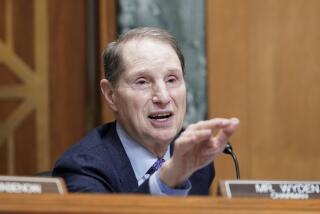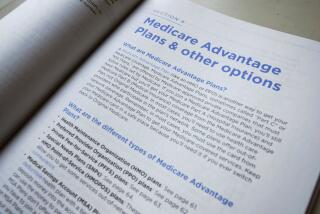Obama administration pushes forward on healthcare partnerships
Working to salvage a much-touted initiative in the new healthcare law aimed at controlling costs, the Obama administration issued revised regulations Thursday to encourage doctors, clinics and hospitals to take greater responsibility for improving patients’ care.
The rules will reward healthcare providers who form partnerships to reduce the cost of caring for Americans on Medicare while also boosting quality, two goals of the sweeping overhaul the president signed last year.
These partnerships -- known as Accountable Care Organizations, or ACOs -- have been held up by many experts as one of the most promising remedies for the poor outcomes and high costs that bedevil the American healthcare system.
Proponents believe that the partnerships could ultimately save taxpayers billions of dollars by better coordinating the care that patients get and replacing the current fragmented system in which patients bounce between doctors and hospitals with little communication between providers.
“ACOs … can represent a very big step forward in helping to transform Medicare, Medicaid and the Children’s Health Insurance Programs so they can help assure high quality, seamless and less costly healthcare,” said Dr. Donald Berwick, who oversees the Medicare and Medicaid programs and worked on the new rules.
The model outlined by the Obama administration would require participating groups of doctors, clinics and hospitals to take responsibility for managing the care of at least 5,000 Medicare patients.
If they reduce the cost of caring for these patients while also hitting benchmarks that measure how good the care they are delivering is for patients, the medical providers could share in the savings with the Medicare program.
Spurred in part by the new healthcare law, private insurers, hospitals and doctors are already exploring these kinds of shared-savings partnerships in the private sector.
But the Obama administration has wrestled with how to craft rules that would provide the right financial incentives to doctors and other providers to form these partnerships to care for the more than 45 million elderly and disabled Americans who rely on Medicare.
And the administration’s first proposal, released in March, was criticized as unworkable, in large part because it demanded too much from medical providers.
The new rules released Thursday ease some of the restrictions.
The administration reduced the number of quality measurements from 65 to 33, for example, and eased a requirement that participating medical providers use electronic medical records.
And it created a system to allow doctors and other providers to sign up without taking responsibility for paying the Medicare program if they cannot produce savings.
Providers who agree to assume the additional risk of cost overruns could get bigger rewards.
“We have made changes in response to what we heard,” Berwick said. “I think they make the program more attractive.”
Initially, between 50 and 270 ACOs may sign up for the program and save the Medicare program as much as $950 million over four years, according to estimates from independent federal actuaries.
noam.levey@latimes.com
More to Read
Get the L.A. Times Politics newsletter
Deeply reported insights into legislation, politics and policy from Sacramento, Washington and beyond. In your inbox three times per week.
You may occasionally receive promotional content from the Los Angeles Times.







